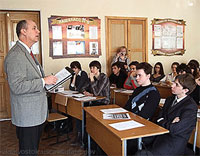Big study of Russian youth sees Putin as a dragon

(Business New Europe – bne.eu – April 22, 2013) A large study by Olga Kryshtanovskaya, Russias leading specialist on elites, into the attitudes of young people in 26 Russian cities found that Russias youth have a largely positive view of the president.
The full report, available online at gefter.ru/archive/8369 and already the subject of discussions in Gazeta.ru (gazeta.ru/politics/2013/04/19_a_5261565.shtml) and PublicPost.ru (publicpost.ru/theme/id/3684/yunoshi_v_rossii_hotyat_revolyucii_a_devushki*uehat/), provides a rich data set that can be mined in a variety of ways.
The survey found students related to their motherland more romantically than did members of older groups, who were more skeptical about Russia, it said.
Kryshtanovskaya told Gazeta.ru that the main discovery of her groups investigation was the high level of anomie among young people, a synonym, she suggested, for the instability of the existing social system and the difficulties individuals face in trying to find a place for themselves in it now that the Soviet social fabric has been torn apart but not replaced, reports Window on Eurasia.
PublicPost.ru provided a summary of what it calls the main conclusions of the study, which was also published by Window on Eurasia include the following:
1. Young Russians fear the powers that be because they are dangerous and pitiless.
2. Young Russians respect only the ideas that come from their closest friends and those they see on television.
3. The younger the Russian, the more inclined he or she is to believe in Russia as a great power.
4. Young Russians blame the Russian bureaucracy for the evils of corruption and theft.
5. Russian young people do not see a chance for themselves to get general respect and acquire material well-being by working honestly within their professions.
6. The heroes of contemporary young Russians are people from politics and show business, not from the professions.
7. Despite the protest attitudes of young Russians, Putin remains the most popular politician among their ranks. He is viewed as a kind of dragon who acts mysteriously and can be replaced only if another such dragon appears.
8. More than 90 percent of young people sincerely declare that there is no party which expresses their interests.
9. Young Russians are ready to move from a small city to a large one, from a large one to the capital, from a regional capital to Moscow, and from Moscow to Europe and America.
10. Young Russians are more inclined to support the complete destruction of the system, even by revolution, than express support for gradual change.
